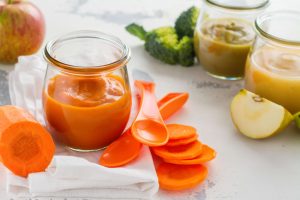Children & Parenting
Weaning guide: How to Introduce Solids To Your Baby
Medically reviewed by Dr. Lim Xue Yan

Introduction
Your baby is now six months old, and it is a perfect time for your infant to be introduced to solids. However, all babies are different and some may not be ready for solids at six months old. As parents, it is important to monitor for signs that your baby is ready for solids.
Read on to learn more about weaning and how to introduce solids to your baby.
When Should My Baby Start Eating Solid Food?
Parents are recommended to introduce solid food to their babies by 6 months of age. It is not advisable to start your child on solid food at 4 months of age due to choking hazards. Watch the signs below to see if your baby is ready for solid food.
Here are some signs your baby is ready for solid food:
- Your baby should be able to sit up against the back of a chair and hold his head up with some help.
- Expresses an interest in food by gazing about or reaching out for your meal while you are eating.
- Opens mouth for an incoming spoon and closes lips around it.
- Tendency to chew and put things in the mouth.
- Even after breastfeeding or bottle feeding, your baby still appears hungry.
If your baby does the following:
- Consistently pushes the spoon out with his tongue.
- Has significant difficulty swallowing solids.
Your baby is not ready for solid foods just yet and you may try again after a week or so.
How to Start Introducing Solids For Your Baby
Once your baby starts exhibiting the above signs that he/she is ready for solid food, what should you do next?
1. Milk Is the Main Source of Nutrition
Until your baby is around 12months old, breast milk or formula milk should remain the main component and main source of nutrition for your baby.
When your baby is 6 to 9 months old, solid meals are designed to supplement, not replace, your baby’s milk feeds.

2. Start With Small Amounts of Solids
When you are just starting, 1 to 2 teaspoons should suffice. This is your baby’s first taste of something new, and the goal is to offer him a small portion.
Over time, you can gradually increase the amount of solid food to 1 to 2 tablespoons. You can then progressively increase portion sizes to a complete meal, which can replace one of your baby’s milk feeds while he gets adjusted to weaning. When your baby is around 10-12 months old, you can start giving him solid foods three times a day (breakfast, lunch, and dinner).
Do not rush the process for your baby. You should allow your child to select the amount of milk (breast milk or formula) or solid food he desires.
Which Foods Can You Feed Your Baby?
As new parents who are starting to introduce solids to the baby, you may wonder what type or kind of foods are suitable.
1. Food Texture: Start Smooth and Soft
6 – 9 months old: The food you feed your infant when he first starts eating solids should be smooth, soft, and fine in texture. You can progressively introduce food that is thicker and coarser as the child grows older and improves his chewing skills—for example, a thicker puree.
10 – 12 months old: At this stage, the food you feed the baby should only be mashed, diced, or cut into little bits.

2. Food Preparation Tips
Here are some food preparation tips to create delicious and nutritious meals for your little one.
- Steamer: Soften hard vegetables such as carrots and meat to make them soft.
- Blender: Pureed vegetables can be made easily.
- Sieve: Used to strain your puree to ensure a smooth consistency and that no hard bits of food remain.
- Fork: To mash and make food easier to consume.
- Spoon: Used to scrape food.
Take note of the following as well when preparing food for your baby:
- Avoid using oils in your cooking.
- Do not use sugar in your cooking as well.
- Do not use seasonings such as table salt or soy sauce, your baby does not need them.
For Busy Working Mums and Dads
Fruit or vegetable purees can be frozen in ice cube trays for up to a month. This is a good time saving method since all you have to do is take one out of the freezer, thaw it, and reheat. Remember to label your baby food with the date it was prepared.
3. How to Puree Different Food Types
Your baby is too young to chew on food and does not have full control over his oral muscles. It is therefore important to puree the food before feeding them.
- Hard fruit: Steam the fruit and mash it with a little breast or formula milk.
- Soft fruit: Puree in a blender or processor (or with a fork) with a little water.
- Vegetable: Steam, blanch, or bake the vegetable (avoid boiling), then purée it with a blender, processor, or fork. Depending on the desired consistency, add more water or milk (breast/formula). If your pureed vegetable is too plain, you can add pureed potato.
- Meat: Deboned and skinless meat should be cooked (steam, boil, or bake), then sliced into small pieces and blended with broth or water until smooth.
Suitable Foods for Your Little One
Here are some food types that can be introduced to your little one. You can seek a paediatrician’s advice if you are unsure of any food items to feed your child.
- Brown rice & wholemeal bread: Brown rice/white rice, Iron-fortified Rice Cereals (in most infant cereals) and Sweet Potato.
- Fruit: Avocado, Watermelons, Apples and Bananas are good choices.
- Vegetables: Carrots, Pumpkin and Cabbage.
- Meat & Others: Chicken, Lentils and Tofu.
What to Avoid Giving Your Baby
Do not introduce the following to your baby:
- Sugary drinks
- Condiments such as table salt/soy sauce/tomato sauce
- Food containing oil and fat
- Uncooked food
- Caffeinated items
- Honey
- Cow’s milk (Only when your child is above 12 months.)
Avoid foods that can be a choking hazard for your child.
- Nuts
- Raw vegetables
- Fish or any meat with bones
- Fruits with seeds etc
Introducing New Foods
At the start, allow your baby to try new foods one at a time. This allows you to determine whether your child has any issues with that meal, such as food allergies. Between each new food, wait for 3 to 5 days. In no time, your baby will be eating and enjoying a wide variety of new foods before you even realise it.
Introduce potentially allergic foods at the same time as other foods.
Cow’s milk products, eggs, fish, shellfish, tree nuts, peanuts, wheat, soy, and sesame are all potential allergens. Cow’s milk and fortified soy beverages should not be given to your child until he or she is at least 12 months old, although other cow’s milk products, such as yoghurt, can be given before then. Consult your child’s paediatrician about when and how to safely introduce foods containing peanuts if your child has severe eczema and/or an egg allergy.
Monitor for Signs of Allergies
When new foods are being introduced, parents should keep a close watch on their children for any signs of allergies. It is highly recommended to visit a paediatrician if your child presents a reaction to any food item given.
Some types of allergies include:
- Hives and worsening eczema.
- Swollen face, eyes, tongue, mouth and lips.
- Watery stools.
- Vomiting.
- Other rare symptoms are breathing difficulties and fainting.
Seek medical consult with your child’s paediatrician immediately if your baby displays any of the above reactions.
Paediatrician’s Tips for Weaning
New parents may be clueless about weaning and therefore have to do a lot of research. The amount of information online may be overwhelming and you may not understand if a certain food item is beneficial for your child.

Here are some quick tips for making the weaning process easier:
- Set a routine for mealtimes: Establish a standard time for meals to get your baby used to mealtime. Avoid giving snacks throughout the day. It is best to have mealtimes at the same place every day.
- Use a high chair: You need both hands to feed your baby. Ensure your child is safe, secure and upright on the high chair during mealtime.
- Be patient: Wait for your baby to open his mouth to take the spoon. Give your baby time to swallow.
- Make mealtime relaxing.
- Do not force-feed, and go with your baby’s pace.
Conclusion
Weaning your child is a process that takes time and effort, and it should never be forced on your child. To know when to start weaning, observe your child for any of the signs mentioned. Take extra care when feeding new food items every 3 – 5 days. When in doubt, seek the help of your child’s paediatrician who can advise you accordingly.
WHO WE ARE
About SOG Health Pte. Ltd.
Established in 2011, SOG Health Pte. Ltd. (“SOG”) is a leading healthcare service provider dedicated to delivering holistic health and wellness services to the modern family.
With a long and established track record in Singapore providing Obstetrics and Gynaecology (“O&G”) services such as pre-pregnancy counselling, delivery, pregnancy and post-delivery care, the Group has since further expanded its spectrum of healthcare services to include Paediatrics, Dermatology, and Cancer-related General Surgery (Colorectal, Breast & Thyroid).
The Group’s clinics, under its four operating segments of O&G, Paediatrics, Oncology and Dermatology, are strategically located throughout Singapore to provide easy access to its patients.
- Obstetrics
- Gynaecology
- GynaeOncology
- Breast, Thyroid & General Surgery
- Colorectal, Endoscopy & General Surgery
- Dermatology
- Paediatrics
Consult With A Specialist From SOG
Visit one of our specialists today to learn more about your health!
Recommended Specialists
Book An Appointment
Fill up this form and our clinic will get back to you shortly.
For general enquiries, please click here.





